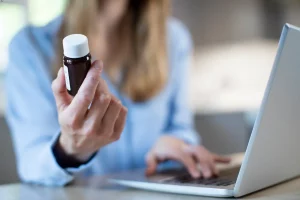Chlamydia is a pretty common sexually transmitted disease that is mainly asymptomatic- the infection doesn’t always cause symptoms, even when it’s present in the body. Unfortunately, because of its asymptomatic nature, many people can have chlamydia for several years without knowing. Chlamydia is an infection caused by the bacteria Chlamydia Trachomatis that can be shared from one person to another during sexual activities like anal, vaginal, or oral sex. Sexually active people between the ages of 16-24 are advised to carry out periodic tests to be sure they don’t have chlamydia. A chlamydia urine test checks for the bacteria that causes chlamydia in your fluid sample.
Typically, your doctor collects your fluid with a swab stick or pee for a chlamydia urine test.
You may submit a sample of your:
- Urine
- Vagina fluid
- Rectum
- Urethra
Because chlamydia doesn’t always show symptoms, people with this infection can easily pass it on to others without knowing.
In addition, chlamydia can be passed on to a newborn baby if the delivering mother has the disease. This is why regular testing is crucial for sexually active young people.
What is a chlamydia urine test?
This type of chlamydia test is more commonly used than other kinds of tests. A chlamydia urine test entails providing a sample of your urine to be sent to a lab for testing.
Usually, the test determines if there is a presence of the bacteria that causes the infection in your urine.
A urine test is called a Nucleic Acid Amplification Test (NAAT), which checks for the DNA of the chlamydia trachomatis in urine.
First, you deliver a sample of your urine to your doctor, who sends the cells to a lab for testing.
If you have chlamydia, the bacteria that causes the infection will reflect on the test.
This type of test is not limited to urine samples alone, fluid from anal or vagina swabs can also suffice.
Why Do I need a chlamydia urine test?
Carrying out a chlamydia test if you’re sexually active is essential for your safety. This is because chlamydia is asymptomatic and doesn’t always show symptoms.
Because of this, the infection can remain in the body for several years without detection.
It is crucial to carry out tests to limit the spread of the infection and avoid the risks associated with untreated chlamydial infections.
There are many risks associated with untreated chlamydia, including a higher risk of contracting sexually transmitted diseases, infertility, and ectopic pregnancy.
You need to get tested regularly for this infection to get the appropriate treatment if you already have it.
Untreated chlamydia can also be spread to your sexual partners when they’re exposed to fluids from you during sex.
What to expect before a urine test
You must ask your doctor what you should do to prepare for a chlamydia urine test. Typically, they may ask you to stick to the following instructions:
Don’t pee for at least two hours before the test
Don’t use creams or douche the vaginal area
Don’t use antibiotics and certain medications
What to expect
You must follow your doctor’s instructions diligently for a chlamydial test. First, your doctor would request that you urinate in a clean cup. Then, you’ll be required to collect the pee as soon as it begins to come out. This is called the first-catch sample.
Sometimes, your doctor can take a sample of your anal or vaginal fluid in place of collecting your urine. They do this using a cotton swab on the inner part of your penis, vagina, or anus.
They can also collect a sample of fluid from your eyes if they suspect you have an infection in your eyes.
If you’re using a home-test kit, you will have to collect the sample on your own. Ensure to follow the instructions on the test skit with dedication.
What to expect after a test
After your doctor has collected your sample, they send it to a lab for chlamydia testing. If you’re using a home-test kit, you would be required to mail the sample you collected to a lab near you. The lab will check for the presence of the bacteria that causes chlamydia in your sample.
Your doctor will contact you with the details of your result when the test is completed.
It is essential to stay away from sexual activities while waiting for your results because if you have the infection, you can spread it to other people.
In addition, you can contract the disease from someone else if you don’t already have it.
Why should I do a chlamydial test?
A chlamydia test is the most reliable way to know if you have the infection.
It is essential to see if you have chlamydia to get the required treatment before the disease causes irreversible damage to your body.
Undergoing treatment for chlamydia saves you from the dangers of a complication. It also protects your partners from getting the infection from you.
What does my chlamydial test result mean?
When your doctor presents the outcome of your test, a positive test indicates that you have chlamydia. In contrast, a negative result suggests you did not have the infection when the sample was collected.
Suppose your test result is positive; there is no reason to panic. Chlamydia can be easily treated with antibiotics.
Your doctor will give you an antibiotic prescription and instructions you must follow to be fully cured of the infection.
You must follow the instructions diligently and finish the entire course of antibiotics prescribed to you for the best result.
In addition, you must also inform your sexual partners of your result. They must be informed that you tested positive so they can get tested and treated, too, if necessary.
If you’ve tested positive, there’s a high chance your partner also has the infection if you’ve engaged in sexual activities together.
So, again, they must get tested and treated, so you don’t contract the infection after completing your treatment.
How frequently should I test for chlamydia?
After you finish your treatment as prescribed by your doctor, you’re advised to test for chlamydia again after three months to ensure the infection has not reoccurred. Chlamydia is notorious for recurrence.
Frequently Asked Questions (FAQs)
There are different ways to check for chlamydia in the body. However, the urine sample test is the most common method for specimen collection.
This is because the bacteria that causes chlamydia can be found in the urine.
Typically, you’ll be required to pee in a container for a urine sample test. Your urine is then sent to a lab to check if the chlamydia bacteria are present.
Chlamydia is mainly asymptomatic. This infection doesn’t usually cause visibly significant symptoms in the body.
However, sometimes symptoms occur when the infection is present. Some of these symptoms include:
- Abnormal vagina discharge
- Pain when urinating
- Abnormal discharge from the penis
- Pain during sex
- Irregular menstruation and bleeding between periods
- Pain in the testes for men
Yes, you can still have symptoms of chlamydia after treatment. Repeat chlamydia infections are common.
Typically, most people start seeing a change in their symptoms within a few days of starting a treatment course.
If you still have symptoms of this infection after treatment, you must inform your doctor for further consideration.
Chlamydia in itself is not fatal. However, if left untreated, chlamydia can cause unwanted complications for women, possibly leading to death.
Such unwanted complications include pelvic inflammatory disease, pregnancy complications, and ectopic pregnancy.
Chlamydia and Neisseria gonorrhoeae are two of the most prevalent STDs. Getting gonorrhea tested is highly recommended.
While chlamydia may not directly lead to fatality, treating this infection is essential before it spirals into a more threatening health condition with irreversible damage done to the body.





